The Nexus 7 (2013) Review
by Anand Lal Shimpi on August 22, 2013 6:00 PM ESTPlatform Power & Battery Life
The new Nexus 7 moves to a slightly smaller battery compared to its predecessor (15Wh vs. 16Wh). The result however is anything but a reduction in battery life. ASUS and Google worked hard to reduce platform power consumption as much as possible. I instrumented both Nexus 7s and measured total platform power, excluding display, to look at the impact of the silicon platform (SoC, PMIC, DRAM, eMMC, WiFi, etc...). The results are beyond impressive:
Idle power is cut in half compared to last year's model. This is by far the most important improvement as most mobile usage models tend to have long periods of idle time. We'll see these power gains reflected in our web browsing test which does have significant periods of simulated reading time between web page loads. The power reduction while running Kraken grows to just over 20%, and even while running Geekbench 3 we see a 16% drop with the new Nexus 7. Only our offscreen 3D test manages to draw more power on the new Nexus 7 than the old one, and that isn't taking into account the nearly 5x increase in performance on the new Nexus. In fact, as impressive as these numbers are - they are even more impressive when you take into account performance. To make a long story short, don't worry about the ~7% decrease in battery capacity as there are enough improvements in platform power and performance (and thus perf per watt) to more than make up for the smaller battery.
We'll start out with our WiFi web browsing test. Like all of our battery life benchmarks we run this test with all devices calibrated to 200 nits and connected to 5GHz 802.11 WiFi (if supported). The test itself cycles through a bunch of desktop websites at a very aggressive frequency. Our test ensures that both the CPU cores and wireless stack can reach their deep sleep states during simulated reading periods. The test continues until the battery is depleted.
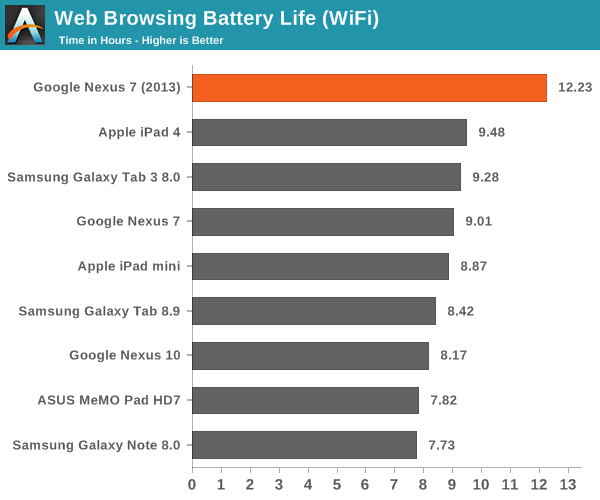
The new Nexus 7 does better here than any other small tablet we've ever tested. Remember that 50% decrease in idle platform power? That's exactly why we're seeing a 35% improvement in battery life compared to the original Nexus 7.
Our video playback test involves looping the playback of a 4Mbps 720p High Profile H.264 transcode of the last Harry Potter Blu-ray. All displays are calibrated to 200 nits.
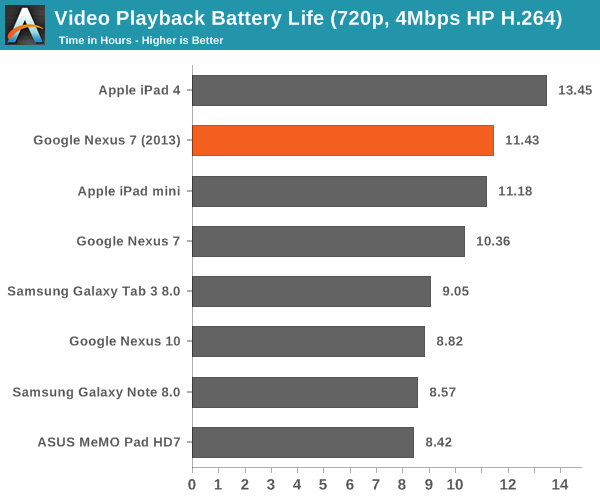
Video decode blocks are fairly well optimized to begin with, so there's not a ton of room for improvement here compared to last year's Nexus 7. Despite the ~7% shrink in battery capacity, the new model manages a 10% increase in battery life though. We also have the first small Android tablet capable of beating the iPad mini in a video playback test here - job well done ASUS/Google.
Our final test involves looping the Egypt HD benchmark until the battery is completely drained. Frame rates are capped to 30 fps to somewhat simulate actual gameplay and not penalize faster GPUs.
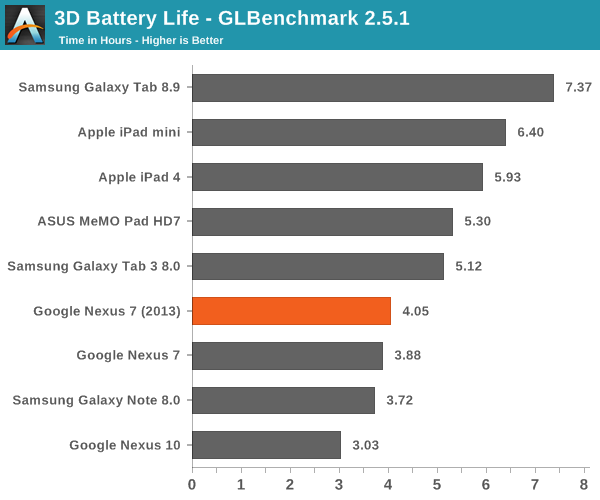
The new Nexus 7 manages to deliver slightly better battery life here despite driving higher frame rates and more pixels. Overall performance here isn't anything super impressive, the only average showing from the Nexus 7.
Google ships the Nexus 7 with an ASUS branded 7W charger, identical to the one you'd find in the box of a MeMO Pad HD7. Given identical chargers and battery capacities, there's no surprise the new Nexus 7 takes the same amount of time to charge as the MeMO Pad HD7 (~3.5 hours).
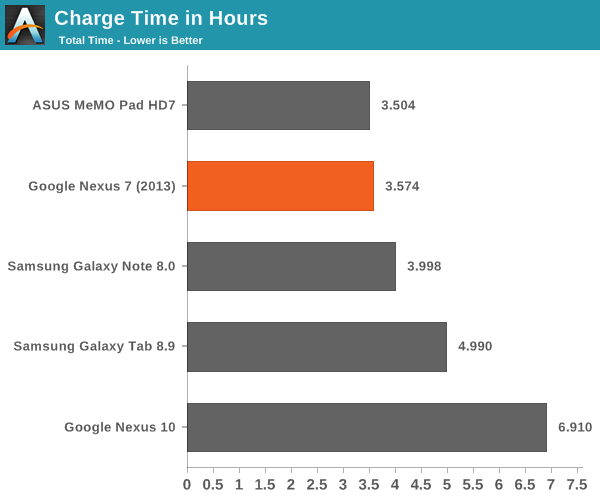
The new Nexus 7 also supports wireless charging by implementing the Qi standard. Charge time is a bit slower wirelessly as Qi can only charge at up to 5W. Brian tested Qi functionality in his mini review of the Nexus 7 and didn't have any issues.


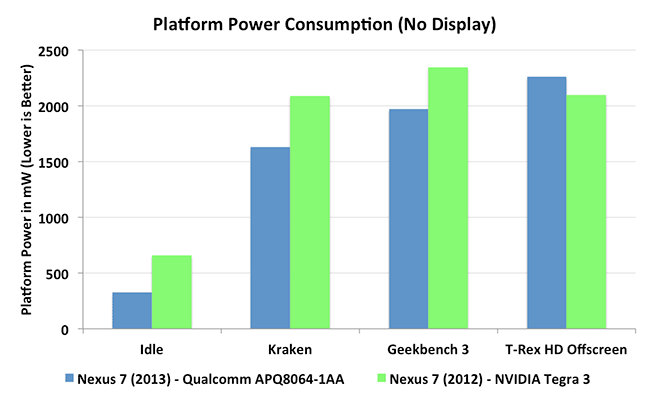
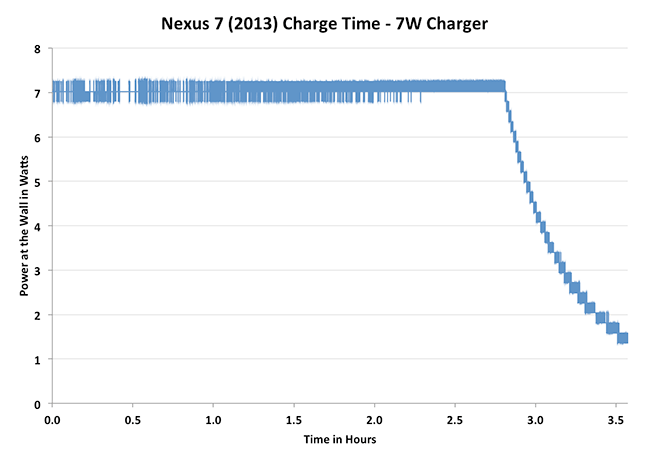








202 Comments
View All Comments
eio - Friday, August 23, 2013 - link
After playing with the new Nexus 7, I seriously think that equip the same 7" screen with a ultra-thin border (like Optimus G2) would be the ultimate form factor of smartphones. It won't be as comfortable to carry as a 5" but the enlarged screen size are much more beneficial for a portable computing device, which what smartphones are nowadays (imo they are not "phone" anymore, everyone is looking instead of talking to them). I can carry a 7" device in my back pocket without much problem, daily.meloz - Friday, August 23, 2013 - link
I so wish this tablet had a 9-inch screen. Then it would be perfect for me. 7-inch tablets do not work for me because of text size; you cannot hold them down (at lap level when sitting in chair) with the the wrists resting on legs. You always have to raise them up like a smartphone to chest height, and that gets tiring if you are sat and reading a long document/file.I wish Asus and Google would make a 9 inch variant of this device. :(
cjs150 - Friday, August 23, 2013 - link
Do what I did. Get a Nook HD+ and root it back to standard android. Although I would also strongly recommend getting a matt screen cover because of the reflections.Works really well as an e-book reader
ShieTar - Friday, August 23, 2013 - link
I just imported myself a Cube U30GT. Its a 10", but surprisingly enough they managed to keep it to 320g, so its as comfortable to hold as most 7" tablets. I can definitely hold it comfortably with one hand while operating the screen with the other one.aniym - Friday, August 23, 2013 - link
Since when did 659g become 320g? Seriously, this spamming of Chinese tablets is getting tiresome? Do you really think that readers of Anandtech, of all sites, are going to fall for your BS?meloz - Friday, August 23, 2013 - link
ShieTar, does your "Cube U30GT" (never head of it before, strange) posses identical specs and performance as the Nexus 7?Somehow I doubt it. I am not interested in disposable Chinese junk.
ShieTar - Monday, August 26, 2013 - link
Nope, it does most certainly not have identical specs and performances. The CPU is admittedly on the slow side, and the hardware is the kind of plastic you expect from a 200$ tablet. I did not try to tell you that it is better in every aspect then the Nexus 7, I merely expected that your reason for wanting a 9" when there is already a ton of 10" devices would be weight, and I offered a comment on that topic.ASEdouardD - Saturday, August 24, 2013 - link
Yeah, it'S 670 g. Way more than 320. Also, I'd stay for away from cheap Chinese tablets for now. Tablets are computers. So many things can go wrong, I have to really trust the company I'm buying this from. I'm sure China (and hey, I don't consider Taiwan part of China) will get there soon and produce high quality tablets, but we're not there yet. Anyway all Android tablets are crap except the Nexus line anyway.ASEdouardD - Saturday, August 24, 2013 - link
To each his own. I feel 7 inch is the best size for me. I find even the iPad Mini too big to carry around a lot. The iPad 4 and the Nexus 10 are just way too big for that. They're more couch tablets then follow you everywhere tablets. I don't even realize I'm carrying around my new Nexus 7 in my man purse (it's European!) because it's so light and small.ASEdouardD - Saturday, August 24, 2013 - link
''than''. Sorry.